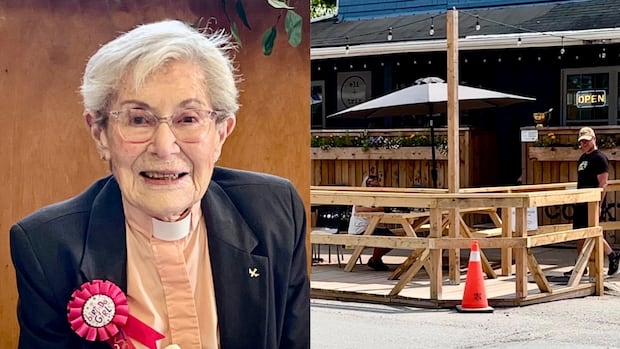Housing ministers focus on solutions tailored to Atlantic region, including factory-built homes

The federal and Atlantic Canadian housing ministers agreed to focus on factory-built housing and a tailored housing framework for the region at a meeting in Halifax on Monday.
“Our meeting today builds on discussions from the Council of Atlantic Premiers meeting, where housing was identified as one of the priorities for the region,” John Lohr, Nova Scotia’s housing minister and meeting host, said in opening the post-meeting media availability at the Halifax Convention Centre.
Lohr said Monday’s meeting produced “meaningful discussions about the unique challenges of Atlantic Canada,” including a predominantly rural and aging population, with a higher proportion of low-income households that require “unique solutions” responsive to the realities of the Atlantic region.
“We also discussed our region’s unique strengths,” Lohr said. “Our spirit of collaboration, our can-do attitudes, as well as the emerging new industries like modular construction, that will enable us to work together to tackle these challenges.”
Lohr said the premiers are excited about the opportunity provided by regional population growth.
“We must be willing to try new things in new ways,” he said. “I am encouraged by the clear demonstration today of shared commitment to do things differently, faster and more collaboratively for the benefit of everyone.”
Lohr said his provincial counterparts and federal Housing Minister Sean Fraser, the MP for Central Nova, are pursuing a common path forward to tackle the housing crisis.
Lohr said there are still many details to work out as the premiers work with federal partners “on a tailored (housing) framework for the Atlantic provinces but what I can say is the Atlantic provinces and the government of Canada will take bold action so people, families, have access to housing they need.”
Out-migration
When it was his turn to speak, Fraser, who took over the federal housing portfolio after a July cabinet shuffle, reflected on growing up in Pictou County
“My whole life, I watched everybody my age move away from Atlantic Canada,” said Fraser, seated next to Lohr and the three ministers responsible for housing in their respective provinces – Jill Green in New Brunswick, Rob Lantz in Prince Edward Island and Paul Pike in Newfoundland and Labrador.
Fraser said he saw the same outflow of people when he first ran for office in 2015, including the closure of a nearby elementary school after families moved away and the loss of a mental health unit at the largest regional hospital in mainland northern Nova Scotia.

“When we have people move away from our communities, the impact is felt in a very real way by people” who live in those communities.
He said in the past several years and with the onset of the COVID pandemic, the out-migration from Atlantic Canada has been reversed.
“This creates enormous social and economic opportunities but it presents challenges that we need to address,” Fraser said. “One of those challenges involves building more homes to accommodate the people we want to move to our communities and to contribute to life in Atlantic Canada.”
Fraser said the challenges associated with growth are preferable to losing schools and hospital services.
“In addition to the existing programs involving support for vulnerable populations with affordable housing construction, what I’m excited about today is our agreement to develop a tailored framework that’s going to help us build more homes faster and that is specific to Atlantic Canada.
Factory built
“Among other things, this framework is going to include supports to grow the factory-built home industry here in Atlantic Canada.”
Fraser was referring to his December announcement that consultation was to begin this month on a housing design catalogue initiative for factory-built housing. That was one of the federal government’s responses to overwhelming criticism of its handling of the escalating cost of living in the country, caused in part by rising home prices and rents.
The Canada Mortgage and Housing Corporation has estimated that 3.5 million more housing units are needed Canada-wide by 2030 in order to start dealing with the housing affordability issue.

In Nova Scotia, the Provincial Housing Needs Assessment report, released in October, points to a current overall housing shortage of between 25,000 and 30,000 units in the province, including a shortage of 15,000 to 20,000 units in Halifax Regional Municipality.
The projected growth scenario showed an estimated 104,800 units are required to meet provincial demand by 2032, 77,100 of which are estimated to be required in HRM.
At the current pace of construction, that puts 6,000 units on the market each year, the Turner Drake report found there will be a shortage of 41,200 housing units by 2027-28 and 44,000 by 2032 if aggressive action is not taken.
The new federal housing design initiative is intended to help accelerate the delivery of homes by standardizing housing designs, starting with low-rise construction. It will explore a potential catalogue to support higher density construction, such as mid-rise buildings, and different forms of housing construction, such as modular and prefabricated homes.
Atlantic chapter
The government will also look at ways to support municipalities, provinces and territories looking to implement their own housing design catalogues.
“We’re going to include specifically a chapter dedicated to Atlantic Canada in the federal catalogue of pre-approved designs and we’re going to recognize needs of Atlantic Canada with co-ordinated programs that capitalize on the federal Reaching Home program and affordable housing funds.”
Fraser said there are details that need to be nailed down to formalize and finalize the Atlantic framework but the agreement achieved at Monday’s meeting will “allow us to deploy the resources that we respectively commit to housing more effectively.”
Fraser said he will meet with the Atlantic ministers in a followup meeting in April in Ottawa and again in Atlantic Canada during the summer.
“This is going to be a continued process where we collaborate to build more homes as quickly as possible but the first step is to agree that we are going to work together and put a little bit of structure into how that is going to happen.”
Fraser said the federal government wants to be a responsible partner in fixing the housing crisis but realizes the delivery of housing for specific communities is best done by local levels of government, whether they be provincial governments or municipalities that are closer to the ground.
“They are going to be able to better tailor the unique solutions in their own community,” he said. “The solution is Halifax will not be the same as Vancouver, will not be the same as New Glasgow.”



